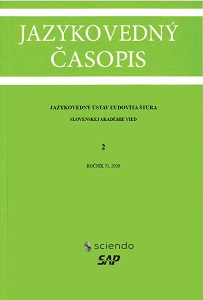Vetné Operátory – Ich Interakcie (s vektormi času, kauzality a epistemickej relevancie) a ich konštrukcie
Sentential operators – their interaction (with vectors of time, causality and epistemic relevance) and their constructions
Author(s): František GahérSubject(s): Theoretical Linguistics, Logic, Semantics
Published by: Jazykovedný ústav Ľudovíta Štúra Slovenskej akadémie vied
Keywords: linguistics; logic; semantics; sentential connectives; “if”-vector; vector of time; epistemic vector; constructions;
Summary/Abstract: The paper starts by briefly describing the so-called truth-functional approach to sentential operators, typical to logic, as opposed to the more multi-faceted approach of linguistics. The latter reflects the more complex, substantial relations between the contents of utterances, emphasizing the logico-semantical relations and functions of sentential operators. However, as an alternative to the pragmatically inclined critique of the truth-functional approach, the paper proposes two possible directions of explaining the specific content of sentential operators by virtue of which they transcend the role of mere truth functions. Firstly, the paper summarizes our previous investigations into the interactions between sentential operators and (1) the vector of the course of events described by a compound sentence, and (2) the direction of grammatical time captured by a compound sentence. The paper focuses on how this interaction is coordinated with the particular epistemic goal (prediction, explanation etc.) pursued when using the meaning of a complex sentence. Using the concepts of necessary and sufficient conditions, and by characterizing the vectors of condition (the if-vector), time and relevance (dominance or the epistemic vector), the paper demarcates the rules of correspondence for conditional operators as cases of combinatorics, as described by some linguists. Secondly, based on a distinction between different constructions the same operators as truth-functions, the paper provides a logico-semantical explanation of the specific meaning of the else, unless and although connectives, traditionally discussed by linguists. We believe that the extensions proposed here move the camp defending a logico-semantic approach to sentential operators at least somewhat closer to the camp of linguistic investigation.
Journal: Jazykovedný časopis
- Issue Year: 71/2020
- Issue No: 2
- Page Range: 197-212
- Page Count: 16
- Language: Slovak

